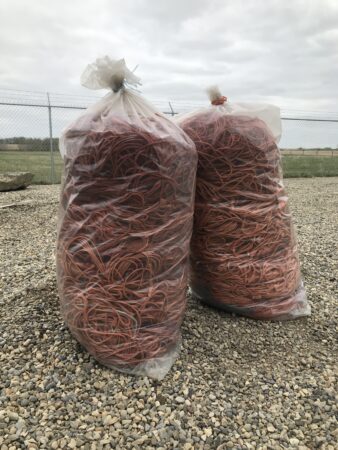
Alta.’s agricultural plastics recycling program gaining ground
by CM Staff

Grain bag plastic is converted into plastic pellets which are shipped to manufacturers across Canada and the USA to be used to make new plastic items.

Alberta farmers use about 2,200 tonnes of plastic baler twine annually. Managing the plastic after it has been cut off hay bales is a challenge for many farmers but a pilot program is focusing on recovering that material so it can be repurposed for use in manufacturing new plastic products. Farmers put the used twine in Cleanfarms collection bags and take it to collection sites for recycling. -Cleanfarms photo
LETHBRIDGE — Farmers in Alberta use about 2,000 tonnes of grain bags and approximately 2,200 tonnes of plastic baler twine annually. These plastic tools are essential in farming operations — grain bags to temporarily store harvested grains, and twine to bind crops for storage and transport. But managing these plastics after use has been challenging for many farmers.
That’s changing under a pilot program called ‘Alberta Ag Plastic. Recycle It!’
The pilot has been developed in Alberta for Alberta farmers. It offers a solution to manage the materials environmentally, giving farmers options to operate their farms sustainably.
From the start of the ‘Recycle It!’ pilot in October 2019 and continuing through December 2022, farmers have brought close to 2,270 tonnes of grain bag plastic and over 336 tonnes of used plastic baler twine to designated collection locations for recycling. For grain bags, that’s equal to 126 semi-trailers full of rolled up grain bags, lined up end to end for two km. The twine collected for recycling equates to the amount that would be used to wrap 922,000 large square hay bales.
The pilot project is led by the multi-stakeholder Agricultural Plastics Recycling Group. Funds were granted for the pilot by the Government of Alberta and are administered by Alberta Beef Producers. The long-term goal is to expand the pilot into a permanent program.
“This time of year, I have my cows on bale grazing and most of the twine I take off my bales is clean and easy to recycle. Putting it in a recycling bag rather than a garbage bag was an easy habit to form and I am glad there is a better place for it to go, rather than into a landfill,” said beef producer and Chair of the Alberta Agricultural Plastics Recycling Group (APRG) Assar Grinde.
Cleanfarms, a non-profit industry stewardship organization operates the Alberta pilot on behalf of APRG.
Cleanfarms arranges for the collection and transportation of the ag plastics as the first step in the recycling process. Used grain bags go to one of two facilities in Alberta, one in Bashaw and the other near Bassano, and baler twine goes to recycling facilities in the US.
Grain bag plastic is converted into plastic pellets which are shipped to manufacturers across Canada and the USA to be used to make new plastic items such as agricultural film plastics, plastic bags, composite dimensional lumber, and agricultural fence posts. Research and development are underway to use these pellets in the manufacturing of new grain bags.
Twine is recycled into plastic pellets which are blended with other plastic resins to manufacture products such as car parts, flowerpots, composite decking, and dimensional lumber.